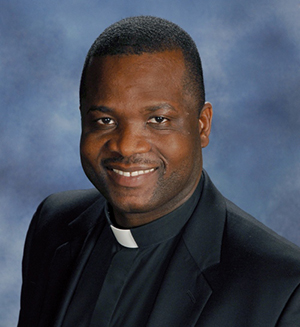By Jim Davis - Florida Catholic
MIAMI | Sure, kids do stupid things. Should that make them criminals for life?
Unfortunately, too often the answer is "Yes" in Florida, where tens of thousands of children start criminal records as young as 5 � crippling their chances in education and employment. But a band of church and lay leaders � Florida bishops prominent among them � is working to change that.

Msgr. Chanel Jeanty, vicar general for the archdiocese and pastor of St. Philip Neri in Miami Gardens, is a board member of PACT (People Acting for Community Together), the DART affiliate in Miami-Dade. He has been meeting with legislators and has had the PACT staff writing letters to public servants arguing for the change in state law which Florida's bishops also support.
Coordinated by the Miami-based DART (Direct Action and Research Training), thousands of congregants around the state are lobbying, e-mailing and holding public meetings to prod elected officials toward effective, merciful treatment of youths.
They're working to expand a 2011 state law on "civil citations," a legal option to set a child right. Instead of mere probation or prison time, a non-violent offender is offered community service and intervention.
Among the generals in this fight for kids is Msgr. Chanel Jeanty, vicar general for the Archdiocese of Miami. As a board member of PACT (People Acting for Community Together), the DART affiliate in Miami-Dade, he has been meeting with legislators and has had the PACT staff writing letters to public servants. PACT members also argued for the change in state law at their annual meeting last year.
"As a Catholic priest, I cannot be indifferent to the plight of 13,000 youths affected by arrest records � some of whom are part of the community I serve," said Msgr. Jeanty, pastor of St. Philip Neri Church in Miami Gardens. "What happens to one happens to all of us."
DART, based in Miami, is a network of 10 action groups around Florida including PACT and BOLD Justice (Broward Organized Leaders Doing Justice) in Broward. They cover the whole state except for the Panhandle.
PACT and BOLD Justice are among the grass-roots organizations that have received funding from the U.S. bishops’ Catholic Campaign for Human Development. Their 200 congregations muster rallies and house meetings each to consider situations that need changing. Their large interchurch rallies each spring provide a voice to some 15,000 congregants across the state.
Similar organizations have spread to other states � including Ohio, Kansas, Kentucky, Indiana, Virginia and South Carolina � a potentially powerful grassroots alliance.
The campaign likewise has the backing of the Florida Conference of Catholic Bishops, the public policy arm of the state's seven dioceses and 2.28 million parishioners. The Tallahassee-based conference stated "expanding civil citation use" as one of its main social concerns for this year.
"The Church stands with victims of crime and their families while challenging our communities to be less retributive and more restorative," says the conference in its Criminal Justice Priorities paper. "We cannot tolerate the crime and violence that threaten the lives and dignity of our sisters and brothers; yet we may not give up on those who have lost their way."
What especially got the attention of DART activists were the state numbers from 2012 � a total of 73,371 youths arrested for nonviolent offenses across Florida, a higher percentage of the population than Texas or California.
Civil citations, authorized in 2011, give law enforcement the option to deal more gently with non-serious misdemeanors, sending offenders to diversion programs rather than prison. If the offenders finish the program, their criminal record is withheld.
The law has already yielded measurable returns. Juvenile misdemeanors fell around Florida by 11 percent from 2012-13 to 2013-14, according to an article in the Miami Herald.
But DART researchers say the option hasn't been applied fairly. They give high marks to Broward and Miami-Dade; other areas, like Polk County, not so high.
Statewide, 13,290 young offenders were offered the civil option in the year ending June 2014. That's only 38 percent of eligible juveniles, DART says.

DART, based in Miami, is a network of 10 action groups around Florida including PACT and BOLD Justice (Broward Organized Leaders Doing Justice) in Broward. They cover the whole state except for the Panhandle. Both PACT and BOLD Justice have received funding from the Catholic Campaign for Human Development.
And although African Americans make up only 21 percent of youths in Florida, they account for half of all youth arrests, the organization adds.
The unfairness comes with a high price, according to DART: nearly $5,000 for processing each youth through the juvenile court system, versus $385 for civil citations. Perhaps worse, recidivism � repeating crimes � approaches is 13 percent for first-time misdemeanor arrests, compared to 4 percent in civil citations.
And the criminal offenses can verge on the "ridiculous," in the view of Sara Wolfer, co-president of BOLD Justice, the Broward group. Over the last five years, she said, 4,839 children were arrested between 5 and 10 years old.
Arrested for what? She mentioned such offenses as shoplifting, throwing an orange on a bus, holding small amounts of marijuana and retrieving a volleyball on private property.
"When you have an arrest record, you can't get college scholarships, you can't enter military service, and it's very hard to get jobs," Wolfer said. "It puts people in a position of failure, starting out so young."
A new bill in Tallahassee, being pushed by the bishops along with DART affiliates, offers several fixes. Police may give someone a warning. They can use the civil citation option more than once. And if they arrest someone for the first offense, they must document why it's necessary for public safety.
The bill is being heard in both wings of the legislature: SB 378 in the Senate, sponsored by Senator Rene Garcia of Hialeah, and HB 99 in the House, sponsored by reps. Gwyndolen Clarke-Reed of Deerfield Beach and Darryl Rouson of St. Petersburg. Committee hearings began in early March.
Msgr. Jeanty said he has made social justice a major facet of the parishes he has served, including St. Bartholomew in Miramar, St. James in North Miami and St. Rose of Lima in Miami Shores.
Civil citations are more than an abstract matter to him: At the age of 15, a cousin was arrested for petty theft committed by a friend at a convenience store. "He was just hanging around with wrong crowd," Msgr. Jeanty said.
Although it was the cousin's first offense, he spent six months at a state prison in Jacksonville. Now he's stuck with low-paying jobs and banned from college scholarships.
"Kids do stupid things," Msgr. Jeanty said. "Later on, it only looks like cruel and unusual punishment. There are better ways of handling minor offenses and to give youths a second chance. Our God is a God of second chances.
"That’s our Catholic understanding of communion and love."
He and others in DART stress that civil citations don’t amount to a "slap on the wrist." The option is not available for violent crimes. An offender must still do community service and make restitution to victims. He or she must also attend a rehabilitation programs.
"They are taught to be more conscious about the consequences of their actions, to make more mature decisions," Msgr. Jeanty said.
How is this a religious duty? DART associates have ready answers from the Bible.
One is Micah 6:8: "This is what God requires of you, only this: to act justly, to love tenderly and to walk humbly with your God." And in Matthew 23:23, Jesus criticizes Pharisees for neglecting, the "weightier matters of the law: justice, mercy and faith."
"I feel called and required by my faith to do justice," said Sara Wolfer of BOLD Justice, who attends Little Flower Church in Hollywood. "When you see something that is not right, you have to do something about it."


Comments from readers